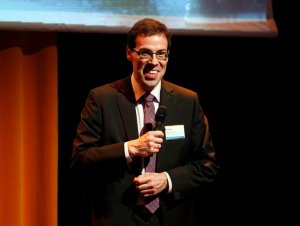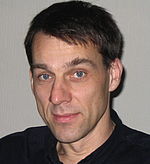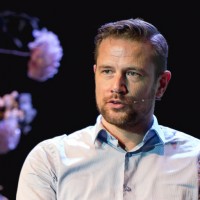Project team
The RADD project team
During the experiments which take place under real-life conditions at Researchlab Automated Driving Delft, researchers collaborate on simple, safe, efficient, and automated transportation from A to B. We would like to introduce you to the team.
 Bart van Arem
Bart van Arem
TU Delft – Full Professor of Transport Modelling, Head of the Transport & Planning department, and Director of the Transport Institute
Bart van Arem is Head of the Transport and Planning department and Director of the TU Delft Transport Institute. In 2009, he was appointed to Full Professor of Transport Modelling at Delft University of Technology.
Bart van Arem received his MSc (1986) and PhD (1990) in applied mathematics at the University of Twente. From 1991 to 2009, he worked at the Netherlands Organisation for Applied Scientific Research and he was a part-time Full Professor at the University of Twente from 2003 to 2012.
Research
Can intelligent vehicles help solve the problem of traffic jams? The expectations for intelligent vehicles are high, but the answer to this question is far from simple. The research primarily focuses on analysing and modelling the implications of the use of intelligent vehicles. These implications vary from human factors to the flow of traffic on roads and networks. The research entails a strong modelling and simulating component which, when possible, is based on empirical data originating from the application of our test vehicles and driving simulators.
 Arjan van Binsbergen
Arjan van Binsbergen
TU Delft – Secretary of the Transport Institute at TU Delft and the Researchlab Automated Driving Delft
Arjan van Binsbergen is secretary of the TU Delft Transport Institute. Before this, he was previously active as the Business Director of the TRAIL Research School and a member of the management team for the BSIK programme “Transitie Duurzame Mobiliteit” (Transitions towards sustainable mobility). He is also a part-time member of the management team for JPI Urban Europe. Arjan studied traffic engineering and planning (MSc in 1992) and later worked as a researcher for several years at TU Delft, earning his PhD there in the field of goods transport in urban distribution (2001).
Areas of focus
Arjan works on connecting various scientific disciplines as well as establishing collaboration between businesses, governments, and knowledge institutes. He is particularly interested in sustainable mobility and goods transport, especially in urban areas. He believes that electric, automated public transport and goods transport can contribute to sustainable cities and increase the availability of transport for people who do not have or want access to a car. Automated vehicles can also help improve traffic safety, which in turn, improves the living environment of cities.
However, there are still a great deal of developments required for the reliable, large-scale application of automated driving. We have much to learn about the interaction between automated and non-automated driving and how automated driving can be functionally integrated into the complete transportation system.
 Winnie Daamen
Winnie Daamen
TU Delft – Associate Professor, Transport & Planning department
Winnie Daamen is an Associate Professor of traffic flow theory and the simulation of the flow of vehicles, pedestrians, and vessels in the Transport & Planning department at TU Delft.
Primary research and expertise
- Thesis: “Modeleren van passagiersstromen in openbare transferia” (Modelling passenger flows in public transfer facilities)
- Subsequent research into pedestrians
- Traffic flow theory and simulation of vehicle and vessel traffic
- Research into the development of a conceptual model for vehicles in narrow lanes
Background
In 1998, Winnie began working on her thesis “Modeleren van passagiersstromen in openbare transferia” as well as the analysis of traffic systems. This specifically concerned the different types of pedestrian behaviour, such as walking, route selection, activity selection, and activity location selection in transport facilities.
In the years that followed, Winnie continued her research on pedestrians including modelling those studies. She applied new data collection techniques in the form of laboratory experiments on a variety of subjects (general walking behaviour, behaviour when boarding and disembarking, behaviour in and around revolving doors, the boarding of persons with disabilities, and the capacity of emergency doors) and optimised these techniques. Using the route data derived from these experiments, she was involved in the formulation of new theories and the further expansion of the pedestrian simulation program, Nomad, as well as the calibration of its parameters.
Over the last few years, Winnie has extended her range of expertise into traffic flow theory and the simulation of vehicle and vessel traffic. She researched empirical data on merging behaviours.
She is currently working on a theory for predicting merging behaviour when driving onto motorways via slip roads. Another area of research involved the development of a conceptual model for vehicles in narrow lanes. In collaboration with the department of Hydraulic Engineering, Winnie is involved in the data analysis, theory, and model development for examining and predicting the passing behaviour of individual vessels in harbours and waterways using simulation techniques equivalent to those applied to pedestrian traffic.
 Riender Happee
Riender Happee
Quartermaster for Research Lab Automated Driving Delft
Riender Happee is an Associate Professor in the faculties of Mechanical Engineering & Civil Engineering at TU Delft. He is also a visiting professor at the Technical University of Munich.
He coordinates projects such as “Human Factors of Automated Driving”, “WEpods autonomous driving in the province of Gelderland”, “From Individual Automated Vehicles to Cooperative Traffic Management”, “Truck Merging Support – a Step towards Autonomous Driving”, “Standardized Self-diagnostic Sensing Systems for Highly Automated Driving”. He also contributes to the projects “Safe interaction of automated vehicles with vulnerable road users” and “Motorcycle Rider Integrated Safety”.
Riender studied Mechanical Engineering (MSc in 1986 & PhD in 1992) at TU Delft and researched traffic safety at the Netherlands Organisation for Applied Scientific Research (TNO): Automotive (1992-2007).
Areas of focus
Riender coordinates automotive education and conducts research in the faculty of Mechanical Engineering, which is organised in collaboration with other faculties. He focuses on human factors for automated vehicles, safe and acceptable interaction with the “driver”, and other road users. From the perspective of his biomechanical expertise, he concentrates on motion perception and comfort.
 Alwin Bakker
Alwin Bakker
Kwartiermaker Researchlab Automated Driving Delft (2017) and FMP (2021)
Alwin is an ambitious, results-oriented team player, who is constantly in search of new and exciting challenges. By creating a bond of trust, he tries to give people that little something “extra”.
He derives satisfaction from contemplating on the new role of the government and its short-term impact on daily activity. On top of that, he makes the impossible possible.
His goal is to create a diverse and engaging work environment with plenty of perspective and personal responsibility. This approach made it possible to get a project as complex and revolutionary as WEpod off the ground in 2016 and put it on the international map in such a short time span. since than continuing his work with his partner Joop Veenis at www.thefuturemobility.network.
Primary relevant experience
- More than 15 years of experience with policy processes and product innovation.
- Spent the past five years involved in the innovation and creation of automated vehicles.
- Has specific experience with government policy, implementation, and motivation.
IN THE MEDIA
- THE GREEN VILLAGE: AN INNOVATIVE TESTING GROUND Published in: Cobouw
- THE NETHERLANDS ‘BEST PREPARED’ FOR AUTONOMOUS CARS, CYCLISTS MAKE ARRIVAL DIFFICULT Published in: NOS
- SENSOR USE WITH AUTONOMOUS VEHICLES Published in: De Volkskrant
- COMEDIAN PIETER JOUKE SEES POSSIBILITIES Published in: delft.nl
- RIJKSOVERHEID.NL: SPEECH BY MINISTER SCHULTZ VAN HAEGEN AT THE OPENING OF THE SMART MOBILITY RESEARCH LAB Published in: Rijksoverheid.nl
NEWS
- VR and Field Study to analyse interaction between pedestrians and autonomous vehicles Published on: Friday 22 February 2019
- Folluw up research car sickness Published on: Wednesday 19 December 2018
- Wanted: Research Opportunity at RADD Published on: Wednesday 07 February 2018
- Bikesim Published on: Monday 23 October 2017
- Opening of Researchlab Automated Driving Delft Published on: Saturday 24 June 2017
